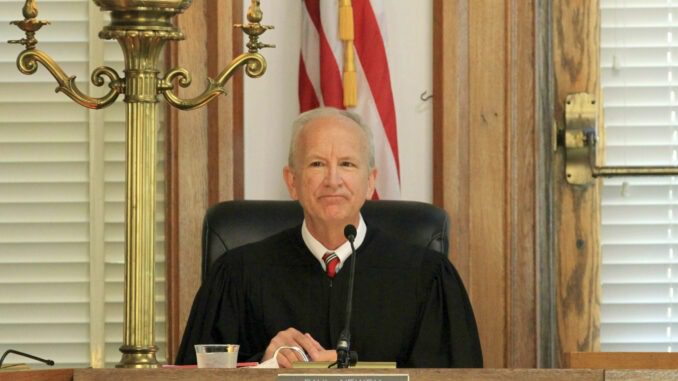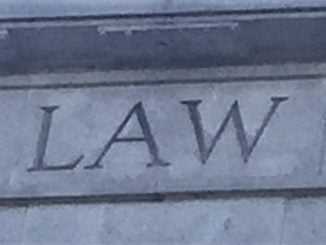
This may be the first article you read that claims Justice Newby has in fact won the election for Chief Justice of the North Carolina Supreme Court. You may ask yourself why this story isn’t being told and why details are so very scarce for one of the closest races in state history. Simply put, it’s not a story that many North Carolina media outlets have an appetite to write, but it’s the truth — and here’s why.
Chief Justice Beasley has declined to concede the election and instead has chosen to protest results in some 87 counties and has filed with the state elections board a record 47 appeals of county rulings.
When all the votes were counted on election night, Newby was ahead. When all 100 counties finished their canvassing process as required by state law, Newby was ahead. When Chief Justice Beasley requested a recount and the totals came in, again, Newby was ahead. The recount is the official result of the race. Justice Newby has won the election, but you’d never know it. So what happens next?
There are two very important efforts running parallel in these post-election activities. The hand-to-eye recount and the appeal process. Every citizen in the state should be fearful of the latter.
First, the (second) recount. Current Chief Justice Beasley has requested a hand-to-eye recount, which she is entitled to do. This spurs a second recount process where a random sampling of 3% of the state’s precincts will again count ballots to ensure accuracy. If the results change enough in Beasley’s favor, this could spur a full-fledged statewide hand-to-eye recount of every ballot. If Newby gains votes, or if the results remain unchanged, Newby’s victory will be validated yet again.
Secondly, the appeal process. Beasley’s campaign is appealing the county denials of her ballot challenges to the state elections board. In lockstep with Beasley’s first recount call on Nov. 17, she filed challenges in 90 counties across the state, alleging that more than 3,000 voters had their ballots illegally tossed out and not counted. On Nov. 20, the Raleigh News & Observer detailed the dubious effort and exposed the Beasley campaign for purging Republicans from these lists under the façade of “count every vote.” The Beasley campaign did not respond to the allegation of disenfranchising Republican voters, which is surprising behavior from the state’s top elected judge.
In near uniform fashion, Beasley’s protests were tossed out of county election boards across the state. At that point, her campaign only had one option: double down and appeal the county decisions to the state elections board. So far, Beasley has 47 county appeals to be considered by the North Carolina State Board of Elections. The prescriptions within Beasley’s appeals are troubling — the campaign is asking the state to overturn the local county decisions, vacate county authority over their rulings, and reconsider her original ballot protests. In addition to requesting the state takeover, the appeals explicitly dictate that Beasley “does not believe that additional information need to be considered” which would force the reconsideration to only focus on the lists provided by Beasley (which was previously exposed for disenfranchising Republicans).
To be direct — the outcome of the chief justice race rests in the hands of the North Carolina State Board of Elections. They have the authority to decide how Beasley’s appealed ballots are counted, and worse, they have a history of subverting election law in the midst of the election. For example, on Sept. 22, after hundreds of thousands of absentee ballots had been cast through the mail, the state elections board created new rules via a very controversial settlement process that subverted state election law and delivered “new guidance” memos to all 100 county elections offices. The settlement at that time would have eliminated the witness requirement on mail-in ballots, allowed unmanned ballot drop-boxes, and extended the time (post-election) to fix and accept absentee ballots by an additional six days —all said to violate state law. With this track record, would it be surprising to see the state elections board issue “new guidance” to county elections boards regarding the handling of these existing appeals?
While we can surmise that meetings are happening now behind the scenes in preparation, the state elections board will meet publicly on Dec. 18 at 10 a.m. to take action on Beasley’s appeals. The state board consists of three Democrats (Damon Circosta, Stella Anderson, Jeff Carmon) and two Republicans (Stacy Eggers, Tommy Tucker). Majority vote rules.
There is little evidence to suggest Beasley’s campaign diverts from this scheme, or that they will stop until every possible resource is exhausted. Why? North Carolina’s voting electorate was not favorable to Democratic candidates, so this last resort to tilt the scales should not be too surprising. North Carolina’s electoral landscape consisted of twenty statewide races. Just four were won by Democratic candidates, all were incumbents. Republicans ran the table on open seats and judicial races (note: seven candidates finished with more votes than Donald Trump).
Leveraging the partisan-controlled state elections board is her campaign’s only option and her recount team are some of the best in the business.
The Forsyth County Board of Elections last week took initiative to go beyond the scope of the Beasley campaign’s protest scheme, which requests the reconsideration of only Democratic voters. The Winston-Salem Journal reported during their recount, “once it was determined that there were provisional ballots that should have been counted, the elections staff re-checked all of the hundreds of rejected provisional ballots, not just the ones identified by the Beasley campaign.” They checked all of the ballots, not just Beasley’s. Every voice should be heard. Forsyth County tossed out Beasley’s protest on a 3-2 vote.
Hopefully, Forsyth’s broad scope is viewed as precedent, not an isolated incident.
Mike Rusher is a public affairs consultant in Raleigh



